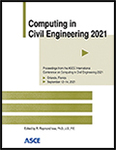An Overview of Root Cause Analysis of Faults in Heating, Ventilation, and Air Conditioning (HVAC) Systems
Publication: Computing in Civil Engineering 2021
ABSTRACT
In recent years, automated fault detection and diagnosis (FDD) has been investigated as a possible solution to the energy waste problem from faulty and inefficient heating, ventilation, and air conditioning (HVAC) systems. During the operation of HVAC systems, a fault in a component is often detected when building occupants feel the effects of its downstream symptoms. Although current FDD methods can identify the presence of anomalous conditions, they provide little insight into how we can address the fault. Root cause analysis (RCA) is a complex diagnosis task that identifies a set of cause-fault-symptom chains and advises corrective actions that a system manager can employ to eliminate the fault and its symptoms. In this paper, we will explore the challenges of autonomous RCA of hardware faults specifically in the air handling unit (AHU) with variable air volume (VAV) terminals and recommend potential ways to support various challenges associated with autonomizing RCA.
Get full access to this chapter
View all available purchase options and get full access to this chapter.
REFERENCES
Boje, C., Guerriero, A., Kubicki, S., and Rezgui, Y. (2020). Towards a semantic Construction Digital Twin: Directions for future research. Automation in Construction, 114, 103179.
Center, I. E. (2003). Results from simulation and laboratory testing of air handling unit and variable air volume box diagnostic tools.
Fan, B., Du, Z., Jin, X., Yang, X., and Guo, Y. (2010). A hybrid FDD strategy for local system of AHU based on artificial neural network and wavelet analysis. Building and environment, 45(12), 2698–2708.
Glaessgen, E., and Stargel, D. (2012, April). The digital twin paradigm for future NASA and US Air Force vehicles. In 53rd AIAA/ASME/ASCE/AHS/ASC structures, structural dynamics and materials conference 20th AIAA/ASME/AHS adaptive structures conference 14th AIAA (p. 1818).
Glymour, C., Zhang, K., and Spirtes, P. (2019). Review of causal discovery methods based on graphical models. Frontiers in genetics, 10, 524.
Goetzler, W., Shandross, R., Young, J., Petritchenko, O., Ringo, D., and McClive, S. (2017). Energy savings potential and RDandD opportunities for commercial building HVAC systems. Navigant Consulting, Burlington, MA (United States).
House, J. M., Vaezi-Nejad, H., and Whitcomb, J. M. (2001). An expert rule set for fault detection in air-handling units/Discussion. Ashrae Transactions, 107, 858.
Hyvärinen, J., and Kärki, S. (1996). International energy agency building optimisation and fault diagnosis source book. Technical Research Centre of Finland, Laboratory of Heating and Ventilation, Espoo, Finland.
Katipamula, S., and Brambley, M. R. (2005a). Methods for fault detection, diagnostics, and prognostics for building systems—a review, part I. HvacandR Research, 11(1), 3–25.
Katipamula, S., and Brambley, M. R. (2005b). Methods for fault detection, diagnostics, and prognostics for building systems—A review, part II. HvacandR Research, 11(2), 169–187.
Khajavi, S. H., Motlagh, N. H., Jaribion, A., Werner, L. C., and Holmström, J. (2019). Digital twin: vision, benefits, boundaries, and creation for buildings. IEEE Access, 7, 147406–147419.
Kim, W., and Katipamula, S. “A review of fault detection and diagnostics methods for building systems.” Science and Technology for the Built Environment 24.1 (2018): 3–21.
Lawrence Berkeley National Laboratory. Buildings.Examples.ScalableBenchmarks.BuildingVAV.Examples. Retrieved from https://simulationresearch.lbl.gov/modelica/releases/latest/help/Buildings_Examples_ScalableBenchmarks_BuildingVAV_Examples.html.
Liu, X., et al. “An integrated performance analysis framework for HVAC systems using heterogeneous data models and building automation systems.” Proceedings of the Fourth ACM Workshop on Embedded Sensing Systems for Energy-Efficiency in Buildings. 2012.
Lu, Q., Parlikad, A. K., Woodall, P., Don Ranasinghe, G., Xie, X., Liang, Z., Konstantinou, E., Heaton, J., and Schooling, J. (2020). Developing a digital twin at building and city levels: case study of West Cambridge campus. Journal of Management in Engineering, 36(3), 05020004.
Najafi, M., Auslander, D. M., Haves, P., and Sohn, M. D. (2012). A statistical pattern analysis framework for rooftop unit diagnostics. HVACandR Research, 18(3), 406–416.
Pearl, J. (2010). An introduction to causal inference. The International Journal of Biostatistics, 6(2), 1–62.
Peng, Y., Zhang, M., Yu, F., Xu, J., and Gao, S. (2020). Digital Twin Hospital Buildings: An Exemplary Case Study through Continuous Lifecycle Integration. Advances in Civil Engineering, 2020.
Provan, G. (2011, October). Generating reduced-order diagnosis models for hvac systems. In Itnl. Workshop on Principles of Diagnosis, Murnau, Germany.
Runge, J., Bathiany, S., Bollt, E., Camps-Valls, G., Coumou, D., Deyle, E., Glymour, C., Kretschmer, M., Mahecha, M. D., Muñoz-Marí, J., and van Nes, E. H. (2019). Inferring causation from time series in Earth system sciences. Nature communications, 10(1), 1–13.
Spirtes, P., Glymour, C. N., Scheines, R., and Heckerman, D. (2000). Causation, prediction, and search. MIT press.
Springer, D. (2016). Expert Meeting Report: HVAC Fault Detection, Diagnosis, and Repair/Replacement. National Renewable Energy Lab.(NREL), Golden, CO (United States).
Wang, H., Chen, Y., Chan, C. W., and Qin, J. (2011). A robust fault detection and diagnosis strategy for pressure-independent VAV terminals of real office buildings. Energy and Buildings, 43(7), 1774–1783.
Yu, D., Li, H., and Yang, M. (2011). A virtual supply airflow rate meter for rooftop air-conditioning units. Building and environment, 46(6), 1292–1302.
Information & Authors
Information
Published In
History
Published online: May 24, 2022
Authors
Metrics & Citations
Metrics
Citations
Download citation
If you have the appropriate software installed, you can download article citation data to the citation manager of your choice. Simply select your manager software from the list below and click Download.
